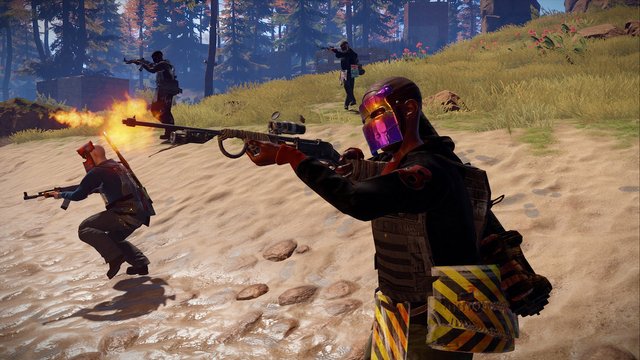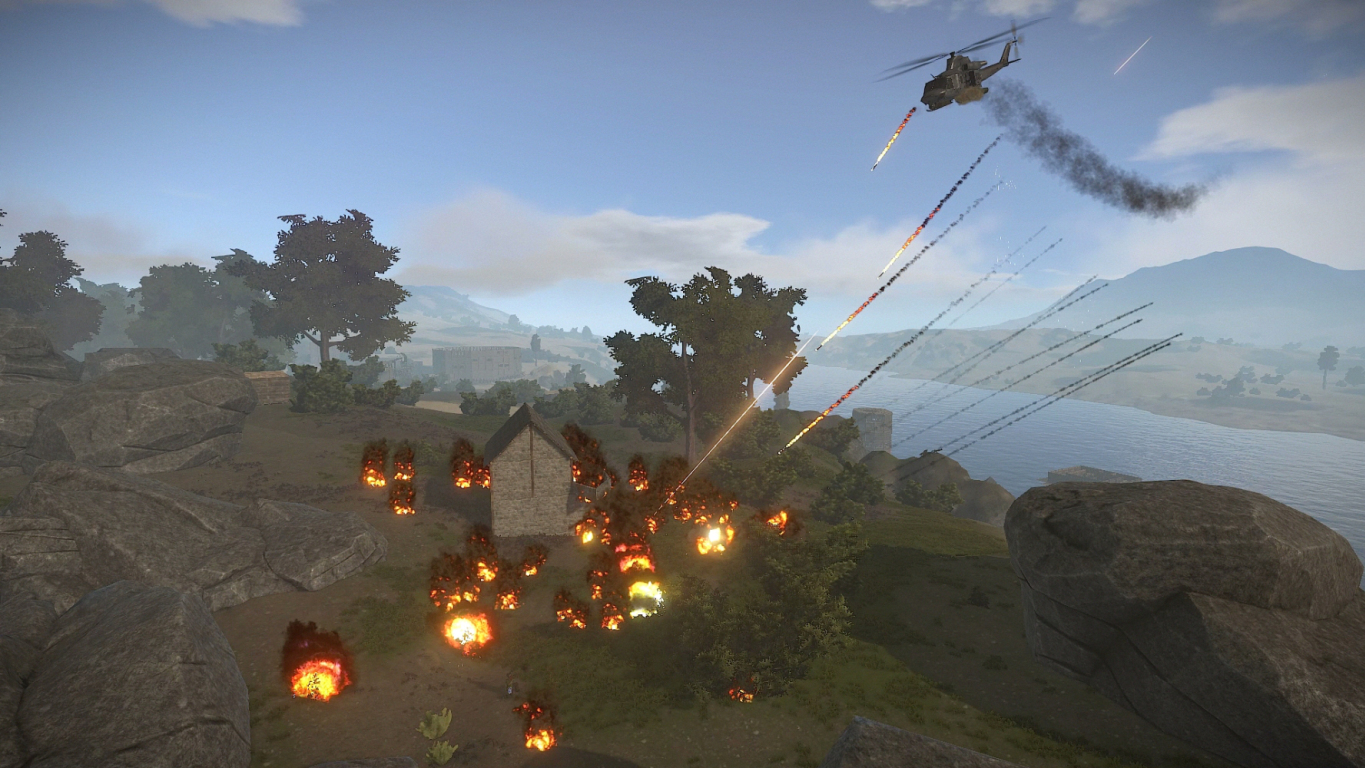Rust (video game)
Rust is a survival video game in development by Facepunch Studios for Microsoft Windows, OS X, and Linux. The game only features multiplayer modes. Rust was initially created as a clone of DayZ, a popular mod for ARMA 2 with the addition of crafting elements. Originally released onto the Steam Early Access program in December 2013, the game is set for full release in February 2018.

The objective of the game is to survive in the wilderness by crafting items using the materials gathered or stolen; the player starts with only a rock and a torch. There is only a multiplayer mode and a prevalent concept in Rust is to form and join clans with other players. Raiding is a very common action, usually done in large clans. Since Rust's first alpha launch, animals, hunting and the ability to craft armor and weapons have been added. It initially featured zombies as enemies, but subsequently replaced them with bears and wolves. Radiation was also removed due to the frustration it was causing players, although it was later reintroduced.
Throughout Rust's alpha release, it was met with mixed critical reviews and many comparisons with other survival games were made, with the most common one being the mixture between DayZ and Minecraft. Reviewers praised the game's concept and gameplay, while also noting its obviously unfinished nature. By March 2017, Rust had sold over five million copies.
Gameplay
Rust pits players against each other in a harsh, open world environment with the sole goal being to survive. Animals, such as wolves and bears, represent a threat to new players, but the primary danger comes from other players. The player vs player combat is accomplished with bows, melee weapons and craftable guns. Bullets and other projectiles travel via a ballistic trajectory. There are multiple different types of bullets for each gun. Damage is calculated using hit tracking, meaning shots to the head are more damaging than shots to other parts of the body. Weapon attachments, such as holosights, can be used to provide an advantage over opponents. In order to survive, the player must craft tools, build bases, and team with other players. Unlike many other sandbox games, Rust only features a multiplayer mode.

Upon starting a new character, the player will have only a rock and a torch, the former of which can be used to cut down trees and break apart stones. In order to survive in the world, the player must gather resources such as wood and stone and use these resources to craft tools, weapons and other gear. The player can gather cloth, food, stone, metal ore, sulfur ore and wood by killing animals, mining rocks and chopping trees. To craft items, players must have all of the required items. Sophisticated items require more materials, alongside consumables called components; items scattered around the map. An important element in Rust are airdrops. These are parachute-equipped pallets of supplies that are delivered via a propeller plane, and can be seen coming in over extremely long distances, resulting in players sometimes running towards the airdrop. Another important element in Rust are attack helicopters. Helicopters spawn in at random intervals and shoot players they see.

The player must stay well fed or they will die of starvation. There are other challenges the player may face during gameplay, such as drowning, hypothermia and attacks from wildlife (primarily from bears and wolves). Specific locales around the map are radioactive. There are three levels of radiation: low, medium, and high. Players must wear the correct armour or clothing if they wish to enter these areas, as they risk dying if they do so without. A prevalent concept in Rust is to form a "clan" with other players. These clans usually create housing for their members, provide items and supplies to each other and partake in organized raiding of other players and looting.

Rust comes out of Early Access in February
After four years, Rust is leaving Steam Early Access.
The multiplayer survival adventure game is coming to Steam’s full marketplace for Windows PC on Feb. 8, 2018. It had been available in Early Access since December 2013.
That said, developer Facepunch Studios isn’t vouching for the game as complete. “Don’t think of this as us claiming that the game is done. Think of this as us saying that if Early Access didn’t exist we’d have released the game on Steam by now,” Facepunch said in a statement.
So why drop the “Early Access” pretense? “Part of leaving Early Access is making the development more stable,” Facepunch reasoned. “That means that not rushing in features and fixes that end up breaking something else. For that reason we’re going to be transitioning to monthly updates.”
That means two versions of Rust will be out in February — a “main branch” and a “staging branch”. The “staging branch” will feature daily updates to the game; the “main branch” will be updated less regularly.
With the full launch, Rust’s price will also increase, to $34.99 from $19.99.